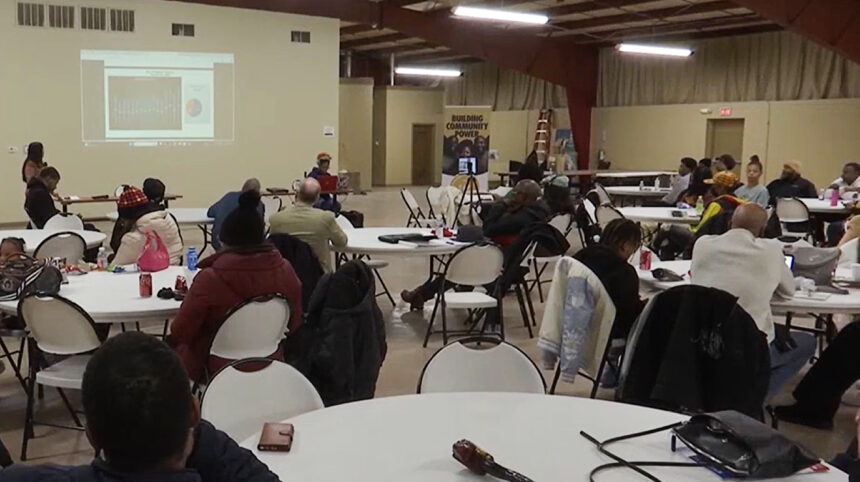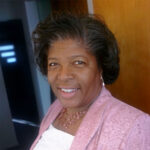SAGINAW, MI — Single-digit temps lingered outdoors but talks inside warmed up at times during a State of Black Saginaw forum organized through CAP, Community Alliance for the People.
On the MLK holiday, CAP founder Jeff Bulls outlined recent forward steps with an increase in local black business owners, school teachers and elected officials. One among the elected group, new City Councilman Eric Braddock, said “gradual change” is moving forward. He was joined by another first-termer, former CAP leader Carly Rose Hammond, along with re-elected Monique Lamar Sylvia.
But still, several participants described still-smoldering anger after Kamala Harris was nipped by Donald Trump in the national campaign. Some included double frustration because Saginaw’s own Pamela Pugh, state school board president, fell short in her bid to take the reins in Congress from the retired Dan Kildee in Congress. Bay City’s Kristen McDonald Rivet won the spot instead; Pugh attended the forum but opted to simply listen.
The first agenda topic was voting, followed by leadership and health. Nearly 100 concerned citizens who braved the cold were so intense on this topical trio that after two hours at the Saginaw County CAC headquarters they postponed the fourth — black dollars in the economy — until another day.
County Clerk Vanessa Guerra opened by showing data that reflected last November’s voter turnout below 50 percent in the city — lower than 40 in some black precincts — severely trailing the suburban, exurban and statewide counts in the two-thirds range and above.
Across the map, in a well-established pattern, the stats showed older people outvoting the younger generation among all ethnic groups, in many cases doubling the percentage turnout. The main difference in Saginaw County was that elders in the ‘burbs outvoted those in the city, but the ensuing CAP discussion focused on the youth.
Admonitions of young people constantly on social media, skipping school and disrespecting parents, drew some approval. But there was bounceback led by one of the few young adults in the audience, RoShawnda Brown, a child care case manager with Saginaw Psychological Services.
Too many adults either fail to speak with school age children, or even worse, ask for young viewpoints and then ignore them, was the sentiment, echoed by Silvia, who in the past helped to manage the New Alternatives youth program in the Wolverine Baptist Center on Hoyt.
“Older people need to be more flexible” in their interactions, Brown summarized, studying to become a psychologist herself.
Another exchange took root when Georgie Wilson, retired Buena Vista school teacher and one of a handful of White people present, described his years of political activism as “light-skinned black” in outlook, but lamented that black leadership in an array of worthy causes should do better in “organizing” for action and said the CAP forum could offer a turning point.
Charles Allen, defeated council candidate, heard this shortly after entering late and gradually raised his voice in sharp dissent that White people have no right to be critical of others after supporting Trump in the past three presidential elections.
While Wilson drew some handclaps, Allen drew a higher level of applause, even after he ripped an increase in Black men who backed Trump, along with how the City Council handled the record-setting $52 million ARPA federal grant. The prior council, like the current, was black majority.
On leadership, one of the audience speakers was former mayor Gary Loster, whose four terms (1993 to 2001) now are being matched by re-appointed Brenda Moore. He continues to organize for top officials, present and past, elected and administrators, to serve as mentors for the upcoming age group, as a sort of leadership institute.
An example cited by County Commissioner Michael Webster is newcomer Amaya Bradley’s victory to become the first Black trustee in Saginaw Township, and her poise in coping with a defeated candidate’s husband, new Commissioner Rich Spitzer, who in error found and posted suggestive Facebook photos of another person with a matching name. Spitzer apologized and joined a unanimous vote of censure.
For health care, Bulls opened with a bottom line that the average lifespan for black people is 71 years, five behind the U.S. population as a whole. There was discussion of some people with historic fears of seeking any medical attention, some with lack of schooling to read and comprehend the info they need.
Bishop Hurley Coleman Jr. delivered the closing after he shook hands with Hurley Coleman III, CAC’s director and forum host, He spoke of love for both his black heritage and for all people. He said that for anyone who wishes to get involved, “there is a connection with some group” that already is addressing the various issues, or at least has tried.
Upcoming Saginaw CAP activities, along with a forum video, will appear on their Facebook page.










